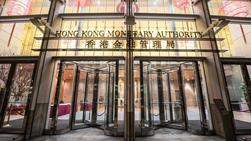 This undated photo shows the building of the Hong Kong Monetary Authority (HKMA). HKMA Deputy Chief Executive Arthur Yuen Kwok-hang said the city's banking system remains stable and has not been affected by the recent collapse of Silicon Valley Bank and the financial woes of Credit Suisse. (PHOTO / IC)
This undated photo shows the building of the Hong Kong Monetary Authority (HKMA). HKMA Deputy Chief Executive Arthur Yuen Kwok-hang said the city's banking system remains stable and has not been affected by the recent collapse of Silicon Valley Bank and the financial woes of Credit Suisse. (PHOTO / IC)
Hong Kong Monetary Authority Deputy Chief Executive Arthur Yuen Kwok-hang said the city’s banking system remains stable and has not been affected by the recent collapse of Silicon Valley Bank and the financial woes of Credit Suisse.
“The recent market volatility has been high, and the HKMA has heightened its vigilance and paid close attention to market developments, and will maintain close contact with local regulatory agencies,” Yuen said after attending the meeting of the Association of Banks on Friday.
Referring to the recent collapse of SVB — at the time the US’ 16th-largest bank — Hong Kong Monetary Authority Deputy Chief Executive Arthur Yuen Kwok-hang said that some banks have a long-term and short-term “mismatch” problem, especially when financial institutions hold long-term debt instruments and sell assets in an environment of rising interest rates, resulting in losses
Yuen said that it is difficult to say whether recent turmoil in global financial institutions will become a replay of the collapse of US investment bank Lehman Brothers in 2008, but regulatory agencies have been acting quickly to stabilize market confidence. “I think it is a good thing, and the market has stabilized,” Yuen said.
Referring to the recent collapse of SVB — at the time the US’ 16th-largest bank — Yuen said that some banks have a long-term and short-term “mismatch” problem, especially when financial institutions hold long-term debt instruments and sell assets in an environment of rising interest rates, resulting in losses.
ALSO READ: SVB demise won't hurt HK, but next Fed move may hurt outlook
However, the local situation is different, he said. “Banks in Hong Kong will not lend out all of their deposits, but only a part of them, and the remaining funds will be used to buy investment products, especially debt instruments. The debt instruments held by banks in Hong Kong are diversified and have short maturities so that the impact of interest rate hikes is relatively low,” Yuen said.
He cited the first half of last year as an example. In the face of recent multiple interest rate hikes, Hong Kong banks recorded losses in their investment portfolios, resulting in a 40-basis-point drop in capital adequacy ratio, but this was a very small amount compared to the over 20 percent capital adequacy ratio.
He also said that requiring banks to disclose their exposure is a routine regulatory tool, and there is no need to make inquiries to banks in response to separate events.
Yuen said he could not comment on the risk exposure of Hong Kong banks to Credit Suisse.
According to local media reports, at least 13 Hong Kong-listed technology and biotech firms have deposits totaling $217.23 million at SVB, with amounts ranging from $400,000 to $175.5 million.
READ MORE: SVB demise a wake-up call to banks
Before its collapse, the California-based technology- and startup-focused SVB was forced to sell its US Treasury bills at a loss. SVB this month announced a fundraising plan that sparked a bank run that led to its collapse on March 10, marking the largest US bank failure since the 2008 financial crisis. The New York state-based Signature Bank also collapsed just two days later. Another regional player, San Francisco-based First Republic Bank, is set to receive a $30 billion lifeline from a group of America’s largest banks amid market volatility over liquidity woes.
The contagion spread to Switzerland-based investment bank and asset manager Credit Suisse, which announced on Thursday it will borrow up to 50 billion Swiss francs ($54 billion) from the Swiss central bank, making it the first major global bank to be given an emergency lifeline since the 2008 financial crisis.


